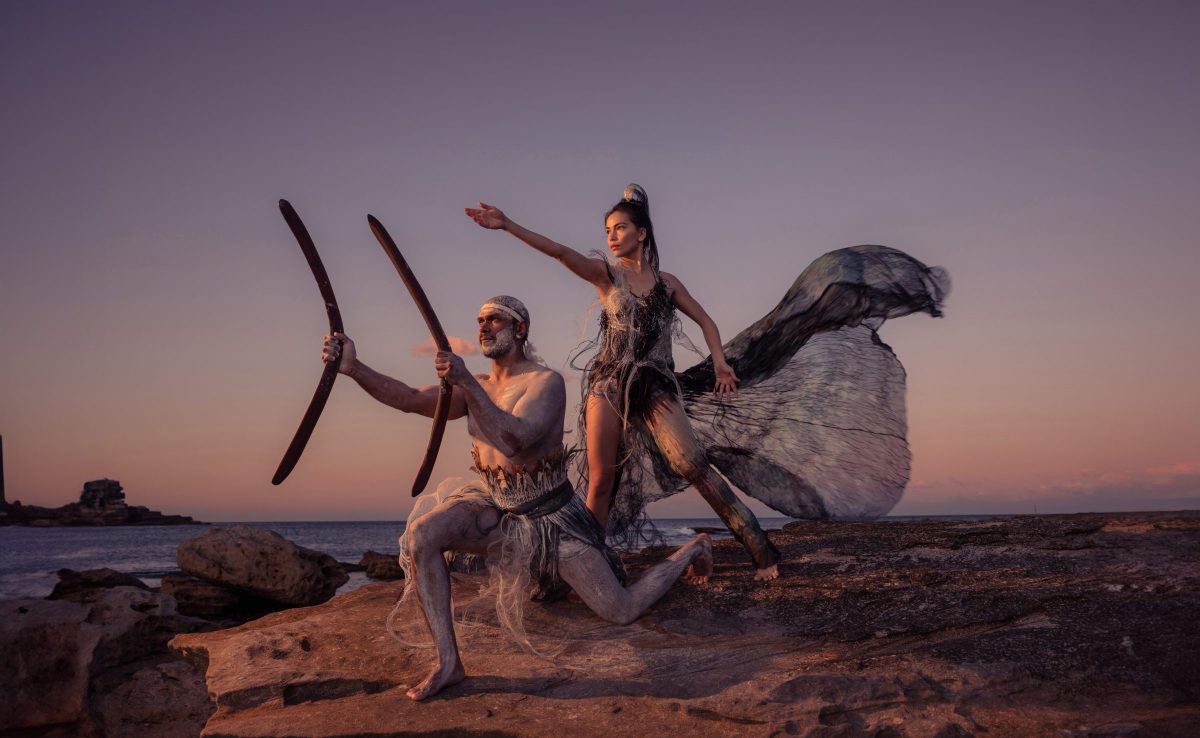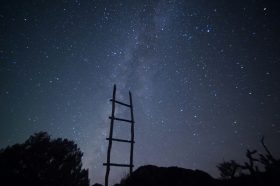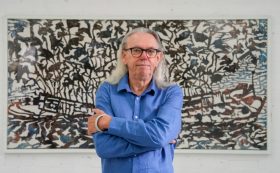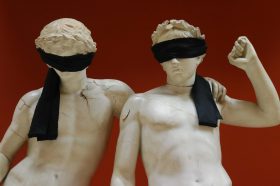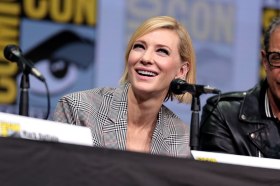‘For all my life – my professional life – I’ve looked to the Adelaide Festival program. It was obligatory, really,’ says Ruth Mackenzie CBE, Artistic Director of the Adelaide Festival.
Mackenzie, who describes Adelaide’s preeminent arts event as part of the ‘premier league of arts festivals internationally,’ is contracted to direct Adelaide Festival from 2024 to 2026.
Having previously worked on festivals and in theatres in the UK and Europe, Mackenzie says the opportunity to ‘learn and discover more about Australian culture and Australian life – especially First Nations culture’ was one of her primary motivations for taking on the role.
‘That’s the pot of gold at the end of the rainbow for me. That’s the reason why it’s so thrilling to be here, and I hope you can see signs of that in the 2024 program,’ she tells ArtsHub.
Mackenzie’s commitment to First Nations culture is immediately visible when perusing the Festival program, with a striking work by Indulkana artist Angkuna Baker, Areyonga (2019) featured on the cover of the printed guide.
Other significant First Nations work in the 2024 Festival include the world premiere of Baleen Moondjan, a contemporary ceremony by Stephen Page (the 2024 Festival’s opening event and Page’s first major work since leaving Bangarra Dance Theatre) and Guuranda, a new theatre work by Narungga/Kaurna choreographer and performer Jacob Boehme.
First Nations first
Discovering the breadth and vitality of First Nations art in Australia has been ‘the most revolutionary part of my first year in Adelaide,’ Mackenzie explains. ‘It has been such a nourishing and inspiring and important part of my creative journey as an Artistic Director here.’
Mackenzie is equally committed to ensuring that her festival programs cater to as diverse an audience as possible.
‘For me, the ideal way of making and sharing art – art in the widest possible sense, across any art form – is when it’s integrated into life and reflects the concerns and ideas of the communities that you’re here to serve,’ she says.
In previous roles, Mackenzie has striven to ensure that young people and non-professional artists have access to engage with and participate in the arts, a passion she continues to dedicate herself to in Adelaide through such initiatives as Create4Adelaide, an exhibition of new artworks created by young people that explore the climate emergency.
‘Art is the language of sharing, understanding, discussing, debating, opposing and answering questions that are fundamental to the community … so our job as an international festival, of course, is to serve our community first and foremost – our communities, plural – but also, we are a platform that is sharing the work of the artists that we program with the rest of the world.’
Given her international perspective (Mackenzie was born in the UK, raised in both South Africa and London, and attended university in Paris), she believes the world is increasingly aware of the impact and beauty of Australian First Nations art, but believes there is still some catching up to do.
‘Obviously it varies across art forms: visual artists have led the way. As you know, I lived in Paris, and it’s scarcely possible to live in Paris and not find an exhibition of incredible Australian First Nation artists on at the Cartier Foundation or the Palais de Tokyo or the Centre Pompidou – mainstream high art galleries. It’s moved out of colonial museums into the mainstream art world, and quite rightly, because Australian visual artists are hot property, and that is amazing.
‘I think in the performing arts we’ve got more work to do to share our outstanding performing artists with the wider world, but that is also happening in Europe now – and there’s lots of interest in North America as well, and that is really important,’ she adds.
The Confederation of Australian International Arts Festivals (of which Adelaide Festival is a key member) plays a major role in building the profile of First Nations performing arts both nationally and internationally by supporting the commissioning, development and showcasing of significant new Australian productions.
‘The commitment to First Nation artists is very consistent across all the festivals, I would say… And if the job of a festival is to give voice to artists, then I think that our responsibility to First Nations artists to help amplify their voices has never been stronger. And that’s a huge responsibility for us and, also, it’s exactly what a festival should do: give voice to artists whose stories are urgent and important and that reflect urgent needs in the communities that we’re serving.’
Other festival highlights
Mackenzie is equally effusive about other elements of the 2024 Adelaide Festival program, such as the Adelaide premiere of Grand Theft Theatre, a production about life-changing theatrical experiences devised by experimental Melbourne theatre collective Pony Cam in collaboration with theatre-maker David Williams.
‘Some of the shows that Pony Cam cite as being life-changing theatre experiences are in fact Adelaide Festival shows, but they also ask the audience to propose your own. “What is the moment, what is the show that you saw that made you think differently, that never left you?” They are absolutely marvellous … and I’m excited to have found them,’ she says.
Adelaide-based companies such as the acclaimed Restless Dance Theatre also feature in Mackenzie’s inaugural Festival.
‘Private View by Restless Dance Theatre dives into giving artists with disabilities the chance to share their views on subjects that are often taboo – desire, romance, love, sex – and it will showcase Restless’ world-class standards. I mean, they are a fantastic company. I really, really admire their work.’
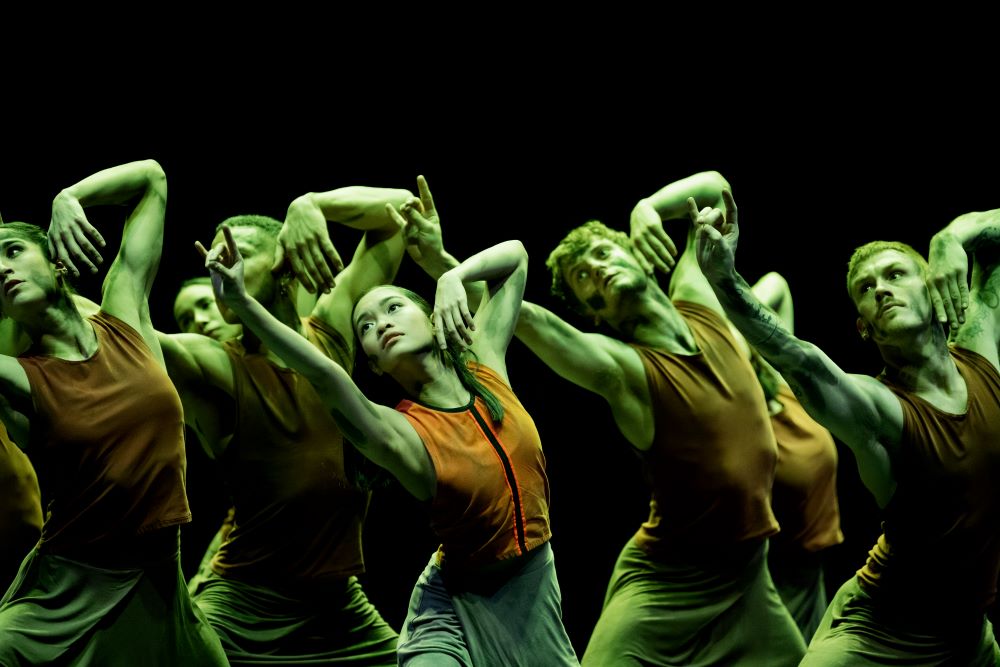
Naturally, international artists feature prominently in the 2024 Festival, including French-Canadian auteur Robert Lepage (whose production of the opera The Nightingale and Other Fables was the first event announced for the 2024 Festival), a durational work by pioneering performance artist Marina Abramović, a new production by acclaimed British choreographer Akram Khan, Jungle Book reimagined, and Goodbye, Lindita by Albanian theatre-maker Mario Banushi, one of the rising stars of European theatre.
‘Part of Adelaide Festival history that everybody has told me about is that they’re very proud of seeing Robert Lepage before he was famous, and they’re also very keen to see Robert Lepage now that he is famous. And that’s really important and we shouldn’t forget that at the core of the program are lots of big names, many of whom are firm favourites with Adelaide Festival audiences,’ Mackenzie explains.
‘There are a lot of big names that shout to the world that this work is going to be great, that this is a guarantee of great work. And that’s a really important context, I think, that everything in the Festival – whether you know the artist or don’t – you’ve got to trust the Festival because we are going to invite you to see the best. That’s what we offer.’
Adelaide Festival 2024 runs from 1-17 March. Visit the Festival website to explore the program and book tickets.
